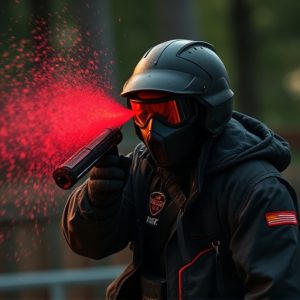Can Pepper Spray Cause Temporary Blindness? An In-Depth Analysis
Pepper spray is a non-lethal self-defense tool primarily composed of oleoresin capsaicin from chili…….
Pepper spray is a non-lethal self-defense tool primarily composed of oleoresin capsaicin from chili peppers. It causes immediate and intense irritation to the eyes, skin, and respiratory system upon deployment, leading to temporary incapacitation but not causing permanent blindness or damage. The severity of its effects, which include eye pain, tearing, and difficulty breathing, can vary based on concentration levels, weather conditions, and individual sensitivity. While it does not result in true blindness, the impact is significant enough to temporarily impair vision, making it a critical defense mechanism. Proper aiming and technique are essential for its effectiveness. It's important to understand that while pepper spray can cause vision impairment that might be likened to temporary "blindness," it does not lead to permanent eye damage. Legal and ethical considerations underscore the importance of using pepper spray responsibly, ensuring it is proportional to the threat and used within the bounds of the law to maintain public safety and civil liberties.
When considering personal safety devices, pepper spray emerges as a widely recognized deterrent. Its effectiveness is well-documented, yet questions persist about its impact on vision. This article delves into whether pepper spray can lead to temporary or permanent blindness and examines the factors influencing its intensity. We’ll explore the chemical composition of pepper spray, its mechanism affecting vision, and the real-life experiences of individuals who have been temporarily or permanently affected by its use. Additionally, we will navigate the complex legal and ethical implications surrounding the use of pepper spray in self-defense and by law enforcement. Can pepper spray blind you? The answer is nuanced and warrants careful consideration. Join us as we unravel this critical aspect of personal defense tools.
Understanding Pepper Spray: Components and Effects
Pepper spray, a popular choice for personal defense, is a form of non-lethal chemical self-defense composed of various capsaicinoids. The primary active component in pepper spray is oleoresin capsaicin, which is derived from chili peppers. When deployed, the compound irritates the eyes, skin, and respiratory system of an attacker, leading to temporary incapacitation. The effects are not confined to visual impairment; they also include intense burning in the eyes, nose, and throat, along with coughing, sneezing, and difficulty in breathing. The intensity of these effects can vary depending on the concentration and wind conditions at the time of use. It’s a common question whether pepper spray can lead to blindness. While it does not cause permanent vision loss or blindness, the intense pain and irritation can temporarily impair vision to the extent that the affected person cannot see for several minutes to hours, which can effectively deter an attacker during a critical moment. Understanding the components and effects of pepper spray is crucial for recognizing its potential impact in self-defense scenarios. Users should be aware that while it provides a temporary protection mechanism, proper aiming and technique are essential to maximize effectiveness and minimize any accidental exposure.
The Mechanism of Pepper Spray: How It Affects Vision
Pepper spray, a highly effective non-lethal self-defense tool, is formulated with capsaicinoid compounds derived from chili peppers. Its primary function is to temporarily incapacitate an attacker by causing intense irritation to the eyes, skin, and respiratory system. When deployed, the active ingredients in pepper spray vaporize and come into contact with the mucous membranes of the eyes, triggering a cascade of physiological responses. The capsaicinoids bind to pain receptors known as TRVP1 in the eyes, initiating an overwhelming sensation that can lead to involuntary blinking and tearing, attempting to flush out the irritant. This response can temporarily impair vision by causing lacrimation (excessive tearing), conjunctival redness, and corneal swelling, making it difficult for the assailant to see. While pepper spray does not “blind” someone in a permanent or absolute sense, as it does not cause structural damage to the eyes, it can significantly reduce visibility to the point where escape may be the only option available to the targeted individual.
The effects of pepper spray on vision are both immediate and potent. Within seconds of exposure, the eyes can become so intensely irritated that the victim is incapacitated. The pain and discomfort caused by the spray can be so severe that it forces the person to close their eyes, further obscuring their sight. The intense stimulation of sensory neurons not only creates a burning sensation but also leads to miosis, or the narrowing of the pupils, which can reduce the amount of light entering the eye and further impair vision. Additionally, the involuntary reflex to rub the eyes after exposure can exacerbate the irritation, potentially leading to abrasions or further temporary visual impairment. It is crucial for individuals using pepper spray to be aware of its effects and to understand that while it may not cause blindness in a medical sense, it can render an attacker visually impaired for several minutes, offering a clear window of opportunity for escape or defense.
Assessing the Risk: Factors That Determine Pepper Spray Intensity
When considering the potency of pepper spray and its ability to cause temporary blindness, several factors play a crucial role in determining the intensity of its effects. The primary component in pepper sprays is oleoresin capsicoid (OCR), which irritates the eyes, causing them to close reflexively. This reaction can lead to a temporary inability to see, often referred to as “blinding.” However, the severity of this effect varies depending on the concentration and delivery method of the spray. A higher concentration of OCR will naturally result in more potent and prolonged effects. Additionally, environmental factors such as wind direction can influence how the spray disperses and whether it’s directly inhaled or diluted upon contact with the air. The proximity between the user and the target also affects the intensity; a closer range allows for a more concentrated application, which intensifies the impact. It’s essential to understand that while pepper spray can indeed cause a state akin to blindness, not all sprays are created equal, nor do they have the same immediate and long-term effects on all individuals. Factors such as the health of the eyes, pre-existing conditions, and personal tolerance to the spray’s ingredients can also influence the level of impairment experienced. Users should be aware that while pepper spray is a non-lethal self-defense tool, its use can have significant and immediate effects on an attacker’s vision, potentially leading to temporary blindness.
Personal Experiences: Accounts from Individuals Permanently Affected by Pepper Spray
While pepper spray is marketed as a non-lethal self-defense tool, its effects can be severe and, in some instances, life-altering. Individuals who have been directly sprayed with pepper spray have recounted experiences that highlight the intensity of its impact. For example, one person shared their story about being temporarily blinded after being sprayed during an altercation. The excruciating pain and immediate disorientation left them unable to see for several minutes. Even after the effects had subsided, they experienced prolonged sensitivity to light and a lingering fear of sudden movements or bright flashes, which are common triggers for those who have been affected by pepper spray. Another individual reported an experience where the spray caused permanent damage to their eyes. They described a persistent blurriness and reduced visual acuity that significantly impacted their daily life. These accounts underscore the potential of pepper spray to cause serious harm to the eyes, potentially leading to temporary or even permanent vision loss, which raises important considerations about its use in self-defense scenarios. The severity of these personal experiences serves as a stark reminder of the capabilities and risks associated with pepper spray.
Legal and Ethical Considerations: The Use of Pepper Spray in Self-Defense and Law Enforcement
Pepper spray, a form of non-lethal chemical self-defense, has become a widely used tool for both personal defense and law enforcement. Its active ingredient, capsaicin derived from chili peppers, can cause intense irritation upon contact with the eyes, skin, or respiratory system. The question often arises: Can pepper spray blind you? While it does not cause permanent blindness, the effects can temporarily impair vision to the extent that it might as well be considered blinding in immediate reaction contexts. In self-defense scenarios, the use of pepper spray is generally legal when employed to protect oneself against an imminent threat of harm. However, ethical considerations come into play regarding its deployment. The American Legal Institute and other legal bodies recognize that the use of force, including pepper spray, should be proportional to the level of threat faced. In law enforcement, the application of pepper spray is governed by strict policies to ensure its use is justified and necessary, often requiring officers to issue verbal warnings before resorting to chemical irritants. The ethical implications are significant, as misuse can lead to unintended harm or violations of civil rights. Therefore, both personal users and law enforcement officials must navigate these legal and ethical considerations carefully to ensure the use of pepper spray is justified, proportionate, and within the bounds of the law.


